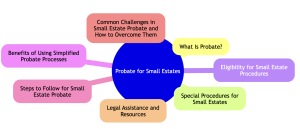Introduction to Probate for Small Estates
Probate for small estates is simpler and less expensive than probate for larger estates. There are special procedures to know for this simplified process.
Probate is the legal process of validating a will and distributing the deceased’s assets. Small estates often benefit from streamlined processes that reduce the complexity and duration of probate, making it essential to be informed about these specific considerations.
Montana Elder Law knows the ins and outs of probate and settling estates. Let us help today!
Key Takeaways
- Definition of Probate and Its Purpose: Probate is the legal process that validates a will and manages the distribution of the deceased’s assets.
- Special Procedures for Small Estates: Simplified processes like small estate affidavits and summary administration expedite probate for estates under specific value thresholds.
- Thresholds for Small Estate Eligibility: Estates valued under $50,000 for affidavit procedures and under $100,000 for summary administration qualify for simplified probate.
- Benefits of Using Simplified Probate Processes: These processes reduce time, cost, and complexity, making probate more manageable for smaller estates.
- Common Challenges and Solutions in Small Estate Probate: Issues such as disputes among heirs, missing assets, and outstanding debts can arise, but can be addressed with clear communication, thorough asset searches, and strategic debt management.

What Is Probate?
Probate is the judicial process for settling a deceased person’s estate, ensuring debts are paid, and distributing assets according to the will or state law.
This process is necessary to validate the deceased’s will and facilitate the legal transfer of assets.
Legal validation of the will
- Appointment of a personal representative: A court-appointed individual manages the estate.
- Inventory of assets: Documenting all assets owned by the deceased.
- Payment of debts and taxes: Settling any outstanding obligations.
- Distribution of remaining assets: Allocating the residual estate to beneficiaries.
Special Procedures for Small Estates
For small estates, Montana offers streamlined procedures that significantly simplify the probate process. These procedures help reduce the time and cost associated with traditional probate, making it easier for families to manage the estate. (1)
Procedures Available:
Montana allows for small estate affidavit procedures and summary administration for qualifying estates. These methods bypass the more complex steps of standard probate, offering a faster resolution.
Comparison of Probate Procedures for Small Estates
| Procedure | Eligibility Criteria | Process Steps | Typical Duration |
| Affidavit Procedure | Estate value under $50,000 | Filing affidavit with court, collecting assets | 1-2 months |
| Summary Administration | Estate value under $100,000 | Simplified court proceedings, asset distribution | 2-3 months |
| Traditional Probate (for reference) | Estates exceeding small estate thresholds | Full court process, multiple steps | 6-12 months |
Eligibility for Small Estate Procedures
Determining whether an estate qualifies as a “small estate” in Montana involves specific criteria. The asset value threshold is a key factor.
Asset Value Thresholds and Types of Assets
Montana law stipulates that a small estate must have a total value below certain thresholds to qualify.
Specifically, an estate with a total value under $50,000 may use the small estate affidavit procedure, while estates valued under $100,000 may qualify for summary administration.
This valuation includes real estate, personal property, and certain financial accounts.
Specific Montana Laws and Eligibility
Montana’s laws provide detailed guidelines on what constitutes a small estate.
These laws specify that estates must meet the value thresholds and consider the types of assets included.
For example, jointly owned property or assets with designated beneficiaries typically do not count towards the estate’s total value for probate purposes.
Benefits of Using Simplified Probate Processes
Simplified probate processes offer several advantages, especially for small estates. These benefits can make a significant difference in the probate experience for families.
Main Benefits
Simplified probate processes can greatly reduce legal fees and expedite the distribution of assets. By minimizing court involvement and paperwork, these processes alleviate much of the administrative burden typically associated with probate.
Advantages of Simplified Probate
- Lower Costs: Reduced legal and administrative fees.
- Faster Resolution: Quicker settlement of the estate.
- Less Court Involvement: Fewer court appearances and legal formalities.
- Reduced Paperwork: Simplified documentation requirements.
- Easier Management: Less complexity for families during an emotionally challenging time.
Steps to Follow for Small Estate Probate
Probating a small estate in Montana can be straightforward if you follow the necessary steps. This process is designed to be less burdensome and more efficient.
Step-by-Step Process:
- Verify the estate qualifies as a small estate: Check that the estate’s total value is below the threshold for small estates in Montana.
- Collect necessary documentation: Gather the death certificate, the will, and a comprehensive list of assets.
- Prepare and file a small estate affidavit with the court: This legal document simplifies the probate process by affirming the estate’s eligibility and the executor’s right to manage it.
- Notify relevant parties: Inform creditors and beneficiaries of the probate process, allowing them to submit claims or inquiries.
- Pay any outstanding debts and taxes: Use the estate’s assets to settle any obligations the deceased left behind.
- Distribute remaining assets to heirs: Once debts are cleared, allocate the remaining assets to the rightful heirs as specified in the will or by state law.
Common Challenges in Small Estate Probate and How to Overcome Them
Handling Disputes Among Heirs
Disputes among heirs can arise over asset distribution or the terms of the will. Clear communication and legal mediation are crucial to manage and resolve these conflicts.
Ensure all parties understand the will’s provisions and seek mediation if necessary to settle disagreements amicably.
Dealing with Missing or Unknown Assets
Identifying and managing assets not initially accounted for can be tricky.
Conduct a thorough search of the deceased’s records, bank statements, and property. If assets are still missing, consider hiring a professional asset locator to ensure all property is included in the estate.
Addressing Outstanding Debts
Managing debts when the estate has limited resources requires strategic planning.
Strategies for Handling Debts:
- Prioritize debts: Pay urgent and necessary debts first, such as taxes and secured loans.
- Negotiate with creditors: Some creditors may accept a partial payment if the estate lacks sufficient funds.
- Seek court guidance: If debts exceed the estate’s assets, the court can provide directions for equitable distribution.
Legal Assistance and Resources
Probate, even for small estates, is made much easier by legal guidance. Legal professionals can streamline the process, helping you avoid common pitfalls and ensuring compliance with state laws.
Importance of Legal Guidance:
Hiring a probate attorney can simplify the complex aspects of probate, providing expertise and peace of mind. They assist with document preparation, court filings, and dispute resolution.
Resources for Assistance:
- Local probate attorneys: Professionals who specialize in estate law and can offer personalized advice.
- Online legal resources: Websites and tools that provide information and document templates.
- Community legal aid services: Organizations that offer free or low-cost legal assistance to those in need.
- Probate court resources: Courts often provide guides and resources to help with the probate process.
- Educational workshops or seminars: Opportunities to learn more about probate from experts in the field.
Probate Services from Montana Elder Law
Now that you have a better understanding of the Montana-specific small estate rules for probate, you are better equipped to plan for the future. Remember to follow the steps we laid out and keep in mind the thresholds.
If you need any legal assistance in this process, Montana Elder Law is a dedicated resource for probate and estate planning, as well as other comprehensive elder law services. Our local expertise guarantees you will receive the soundest legal advice available. Call today!
Visit our homepage HERE for more resources
Reference:
(1) MSU, Probate in Montana, https://apps.msuextension.org/montguide/guide.html?sku=MT199006HR




